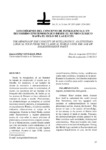Mostrar o rexistro simple do ítem
Los orígenes del concepto de inteligencia I: un recorrido epistemológico desde el mundo clásico hasta el Siglo de las luces
| dc.contributor.author | López González, Laura | es_ES |
| dc.date.accessioned | 2014-09-23T12:37:42Z | |
| dc.date.available | 2014-09-23T12:37:42Z | |
| dc.date.issued | 2013 | es_ES |
| dc.identifier.citation | Revista Galego-Portuguesa de Psicoloxía e Educación, 2013, 21: 35-47. ISSN: 1138-1663 | es_ES |
| dc.identifier.issn | 1138-1663 | es_ES |
| dc.identifier.uri | http://hdl.handle.net/2183/12604 | |
| dc.description.abstract | [Resumen] Desde la Antigüedad, el ser humano ha tratado de comprender el mundo que le rodeaba. En ocasiones, el ser humano ha dotado de animismo o antropomorfismo a fenómenos naturales como la enfermedad, el trueno...La naturaleza del ser humano es la búsqueda del conocimiento, de hecho ya en los poemas de Homero se hace referencia al concepto de mente o psuche. Precisamente, los protopsicólogos ya otorgaban al cerebro funciones como la memoria, el pensamiento y el entendimiento. Platón y Aristóteles también realizaron observaciones al campo de la inteligencia. Durante la Edad Media, autores como Buenaventura y Aquino plantearon puntos de vista sobre la mente próximos al platonismo y al aristotelismo, respectivamente. Es en el Renacimiento, cuando Huarte señaló que eran necesarias cuatro condiciones en el cerebro para que la persona tuviera ingenio y habilidad. Durante el siglo XVII, autores como Descartes, Hobbes, Locke...tendrían una visión más científica y mecánica de la mente. Durante la Ilustración, los filósofos emplearon la razón científica para poder comprender la mente humana | es_ES |
| dc.description.abstract | [Abstract] Since ancient times, humans have tried to understand the world around him. Sometimes, man has equipped with animism or anthropomorphism to natural phenomena such as disease, the thunder... The nature of man is the pursuit of knowledge, in fact already in the poems of Homer refer to the concept of mind or psuche. Precisely, the protopsychologists already granted to the brain functions such as memory, thinking and understanding. Plato and Aristotle also made observations to the field of intelligence. During the Middle Ages, authors as Buenaventura and Aquinus raised points of view on the mind next to the platonism and the aristotelism, respectively. It is in the Renaissance, when Huarte said that four conditions were necessary in the brain so that the person had wit and skill.. During the 17tth century, authors as Descartes, Hobbes, Locke... would have a more scientific and mechanic vision about the mind. During the Age of Enlightenment, philosophers used scientific reason to understand the human mind | es_ES |
| dc.language.iso | spa | es_ES |
| dc.publisher | Universidade da Coruña | es_ES |
| dc.subject | Conocimiento | es_ES |
| dc.subject | Ingenio | es_ES |
| dc.subject | Pensamiento | es_ES |
| dc.subject | Inteligencia | es_ES |
| dc.subject | Knowledge | es_ES |
| dc.subject | Talent | es_ES |
| dc.subject | Thought | es_ES |
| dc.subject | Intelligence | es_ES |
| dc.title | Los orígenes del concepto de inteligencia I: un recorrido epistemológico desde el mundo clásico hasta el Siglo de las luces | es_ES |
| dc.title.alternative | The origins of the concept of intelligence: an epistemological tour from the classical world until the age of enlightenment. Part I. | es_ES |
| dc.type | info:eu-repo/semantics/article | es_ES |
| dc.rights.access | info:eu-repo/semantics/openAccess | es_ES |






